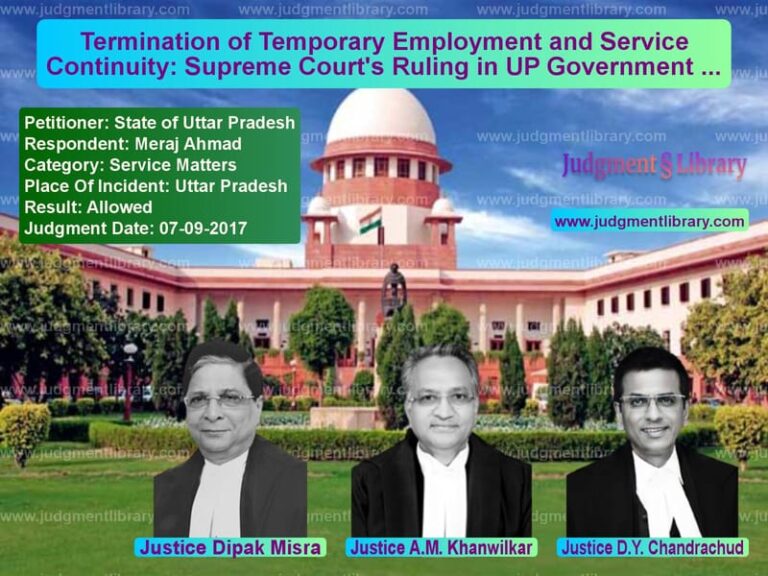Supreme Court Directs Effective Implementation of SC/ST Atrocities Act
The case of National Campaign on Dalit Human Rights vs. Union of India addressed the issue of ineffective implementation of the Scheduled Castes and Scheduled Tribes (Prevention of Atrocities) Act, 1989. The Supreme Court ruled that the central and state governments must take concrete steps to enforce the Act, ensuring the protection of SC/ST communities from caste-based atrocities.
Background of the Case
The petitioners, a coalition of voluntary organizations working for the rights of Scheduled Castes and Scheduled Tribes, filed a writ petition in 2006. They argued that despite the existence of the SC/ST (Prevention of Atrocities) Act, 1989, its implementation remained weak, leaving Dalit and Adivasi communities vulnerable to violence and discrimination.
The petition sought several reliefs, including:
- Appointment of Special Officers, Nodal Officers, and Protection Cells to oversee implementation.
- Mandatory registration and expeditious investigation of FIRs related to caste atrocities.
- Creation of Special Courts in every district to ensure speedy trials.
- Identification of atrocity-prone areas and preventive action.
- Regular monitoring by judicial officers to ensure priority trials.
- Rehabilitation packages for victims and their families.
- Periodic training for police and judicial officers to handle SC/ST cases effectively.
Legal Issues
- Whether the central and state governments had failed in their duty to enforce the SC/ST (Prevention of Atrocities) Act effectively.
- Whether the victims of caste-based violence were receiving timely justice.
- Whether adequate mechanisms were in place to prevent caste atrocities.
- Whether compensation and rehabilitation measures for victims were being implemented properly.
Arguments by the Petitioners
- The failure of law enforcement agencies to register FIRs promptly allowed perpetrators of caste-based violence to escape justice.
- Despite legal provisions, many cases were either dismissed for lack of evidence or delayed indefinitely, leading to injustice.
- Atrocity-prone areas were not properly identified, leaving Dalit and Adivasi communities unprotected.
- Compensation and rehabilitation packages for victims were either delayed or not provided.
- The absence of trained officers in handling SC/ST cases resulted in insensitive and biased investigations.
Arguments by the Respondents
- The Union Government contended that law and order fell under the jurisdiction of state governments.
- Several measures had already been implemented to ensure the proper functioning of the Act.
- Delays in prosecution were attributed to procedural requirements and lack of evidence in certain cases.
- Regular review meetings were conducted to oversee the enforcement of the Act.
Supreme Court’s Judgment
The Supreme Court ruled in favor of the petitioners and directed the central and state governments to:
- Appoint Special and Nodal Officers in every district within six months.
- Ensure that FIRs related to SC/ST atrocities are registered promptly and investigated by an officer of Deputy Superintendent of Police (Dy. SP) rank or higher.
- Set up Special Courts in every district to ensure timely trials.
- Identify atrocity-prone areas and implement preventive measures.
- Ensure that victims and their families receive compensation and rehabilitation as per legal provisions.
- Train police officers and prosecutors on handling SC/ST cases with sensitivity.
- Conduct regular monitoring by judicial officers to ensure priority handling of SC/ST cases.
The Court stated:
“The protection of Scheduled Castes and Scheduled Tribes from atrocities is a constitutional duty, and failure to implement the provisions of the SC/ST (Prevention of Atrocities) Act effectively defeats its very purpose.”
Impact of the Judgment
- Strengthens the enforcement of the SC/ST (Prevention of Atrocities) Act, ensuring better legal protection for Dalit and Adivasi communities.
- Holds law enforcement agencies accountable for delays in investigating and prosecuting cases of caste-based violence.
- Improves access to justice by mandating Special Courts in all districts.
- Ensures financial assistance and rehabilitation for victims of atrocities.
Conclusion
The Supreme Court’s ruling reaffirms the need for strict implementation of laws protecting marginalized communities. By directing the government to take immediate steps, the Court aims to ensure that justice is not denied to victims of caste-based violence.
Don’t miss out on the full details! Download the complete judgment in PDF format below and gain valuable insights instantly!
Download Judgment: National Campaign on vs Union of India Supreme Court of India Judgment Dated 15-12-2016.pdf
Direct Downlaod Judgment: Direct downlaod this Judgment
See all petitions in SC/ST Act Case
See all petitions in Judgment by T.S. Thakur
See all petitions in Judgment by Dhananjaya Y Chandrachud
See all petitions in Judgment by L. Nageswara Rao
See all petitions in allowed
See all petitions in Declared Infructuous
See all petitions in supreme court of India judgments December 2016
See all petitions in 2016 judgments
See all posts in Constitutional Cases Category
See all allowed petitions in Constitutional Cases Category
See all Dismissed petitions in Constitutional Cases Category
See all partially allowed petitions in Constitutional Cases Category







